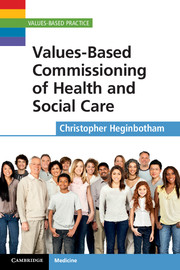Book contents
- Frontmatter
- Contents
- Acknowledgements
- Preface: Values-based Commissioning
- List of Abbreviations
- Chapter 1 Values-based practice in health and social care
- Chapter 2 Policy and practice
- Chapter 3 Health and social care reforms in England
- Chapter 4 Evidence and outcomes: commissioning for value
- Chapter 5 Patient and public involvement
- Chapter 6 The ‘new’ public health
- Chapter 7 Integrative commissioning for health and social care
- Chapter 8 Priority setting and resource allocation: values, ethics, evidence
- Chapter 9 Outcomes-led commissioning
- Chapter 10 Market stimulation and market shaping
- Chapter 11 Values-based leadership
- Endnote
- References
- Index
Chapter 9 - Outcomes-led commissioning
Published online by Cambridge University Press: 05 July 2012
- Frontmatter
- Contents
- Acknowledgements
- Preface: Values-based Commissioning
- List of Abbreviations
- Chapter 1 Values-based practice in health and social care
- Chapter 2 Policy and practice
- Chapter 3 Health and social care reforms in England
- Chapter 4 Evidence and outcomes: commissioning for value
- Chapter 5 Patient and public involvement
- Chapter 6 The ‘new’ public health
- Chapter 7 Integrative commissioning for health and social care
- Chapter 8 Priority setting and resource allocation: values, ethics, evidence
- Chapter 9 Outcomes-led commissioning
- Chapter 10 Market stimulation and market shaping
- Chapter 11 Values-based leadership
- Endnote
- References
- Index
Summary
Developing a stronger focus on outcomes in health and social care has been an objective of the Department of Health and various institutions and academic bodies for at least the last 20 years. This quest for an effective outcome-based approach to commissioning and providing services was underlined again by the White Paper, Equity and Excellence: Liberating the NHS (Department of Health, 2010a) and associated working papers, notably the consultation on outcomes led commissioning, the NHS Outcomes Framework 2011–12 (Department of Health, 2011c), and the consultation paper Healthy Lives, Healthy People: transparency in outcomes (Department of Health, 2011a, 2011b).
While an emphasis on outcomes is both timely and welcome the consultation papers have demonstrated once again the difficulties associated with identifying outcomes that are sufficiently robust to be used as contract currency. We take as axiomatic that a greater emphasis on outcomes is desirable and achievable, but recognise that implementing a truly outcomes focused approach will be enormously difficult for a number of reasons.
In a seminal paper, Donabedian (1988) demonstrated that quality in health care requires a proper integration of structural features (such as input resources and outputs achieved), processes related to offering care, and the outcomes of that care. He emphasised the importance of balance: every outcome has some form of supporting process which in turn requires a set of inputs. Focusing on outcomes to the detriment of inputs will not achieve the goal of improving outcomes; conversely placing undue weight on structural features (inputs or outputs) will not realise the best outcomes.
- Type
- Chapter
- Information
- Values-Based Commissioning of Health and Social Care , pp. 101 - 114Publisher: Cambridge University PressPrint publication year: 2012



